
After a battle with brain cancer, my dear amigo Bill Gruben has passed onto new and surely most wondrous adventures. He had such a good heart and a brilliant, wildly whimsical sense of humor. I will miss him more than I can say.
I met Bill some 30 years ago when I was working as an economist in Mexico City and he as an economist with the Dallas Fed. New flash: Not all economists are just economists! Bill, who spoke fluent Spanish and knew more about Mexico than most Mexicans, had written jokes for Joan Rivers and Phyllis Diller and published some of his brilliant comedic essays about Texas in no less a venue than The Atlantic Monthly. I was then already writing poems and short stories, and translating Mexican poetry. Later, when I got the notion to publish Tameme, a bilingual literary journal that brought together writers and poets from Canada, the US, and Mexico in bilingual English/ Spanish format, I asked Bill if he would contribute something to the first issue. I was immensely honored and quite tickled when he sent me “Animals in the Arts in Texas.” It was translated into Spanish by the splendid Mexican poet and novelist Agustín Cadena. In Bill’s memory, herewith that piece from Tameme, originally published in 1999:
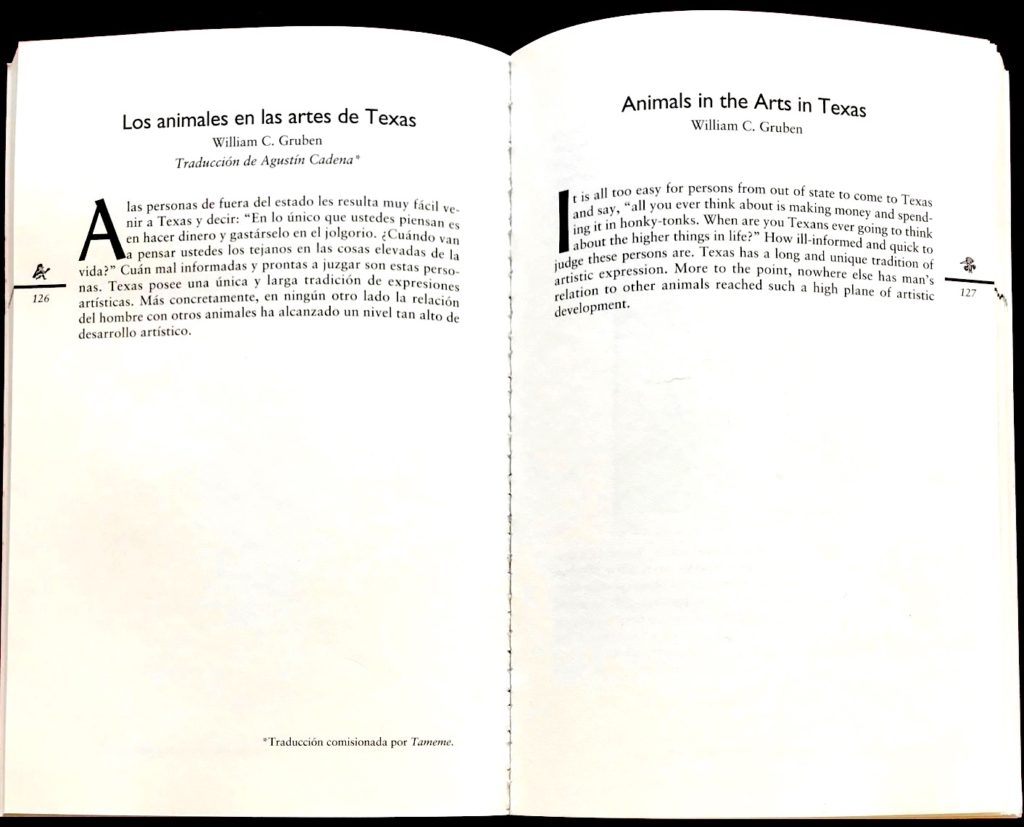
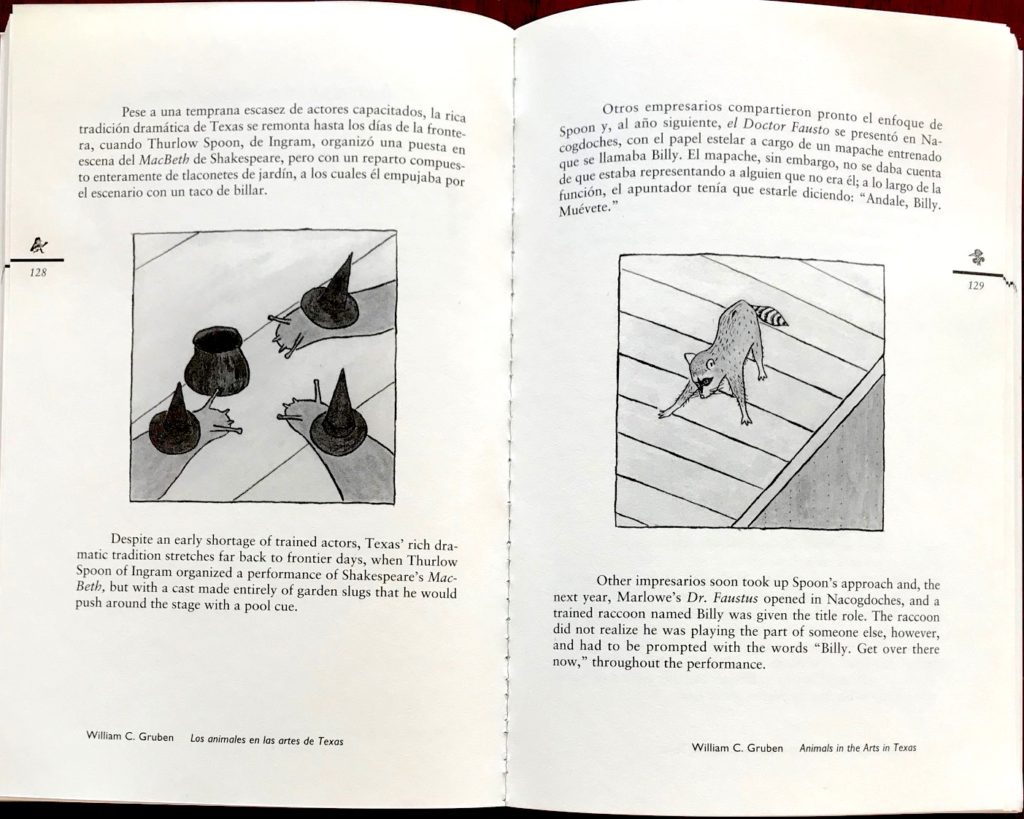
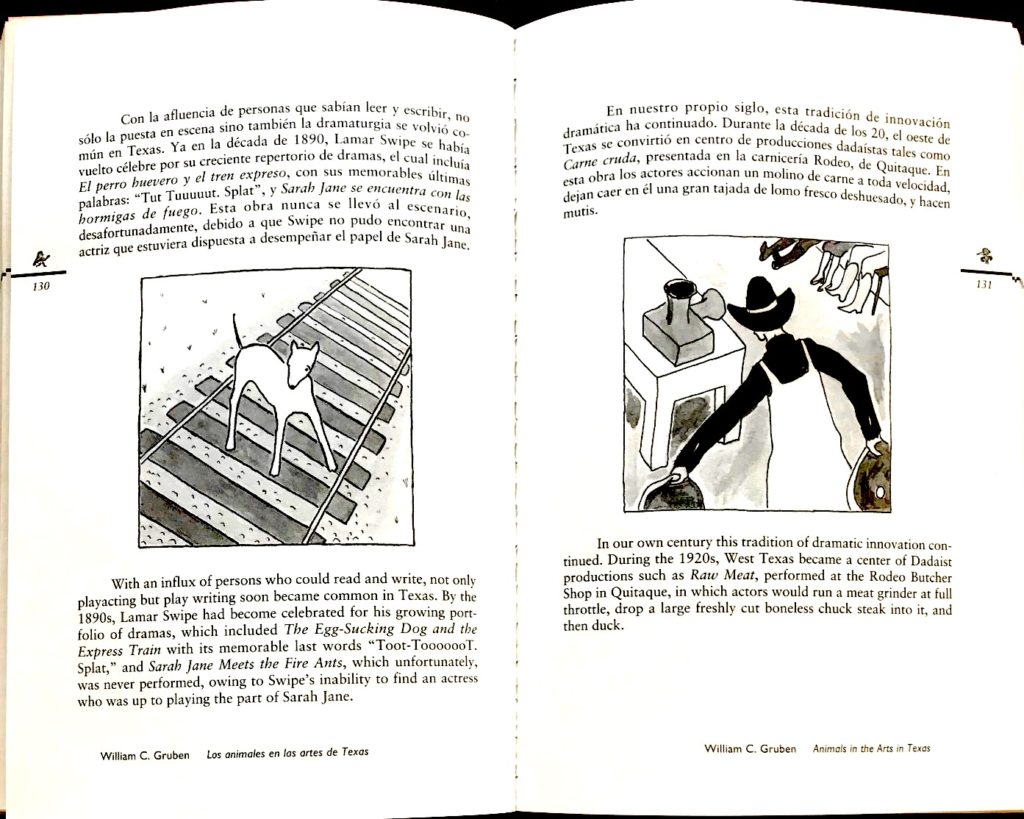
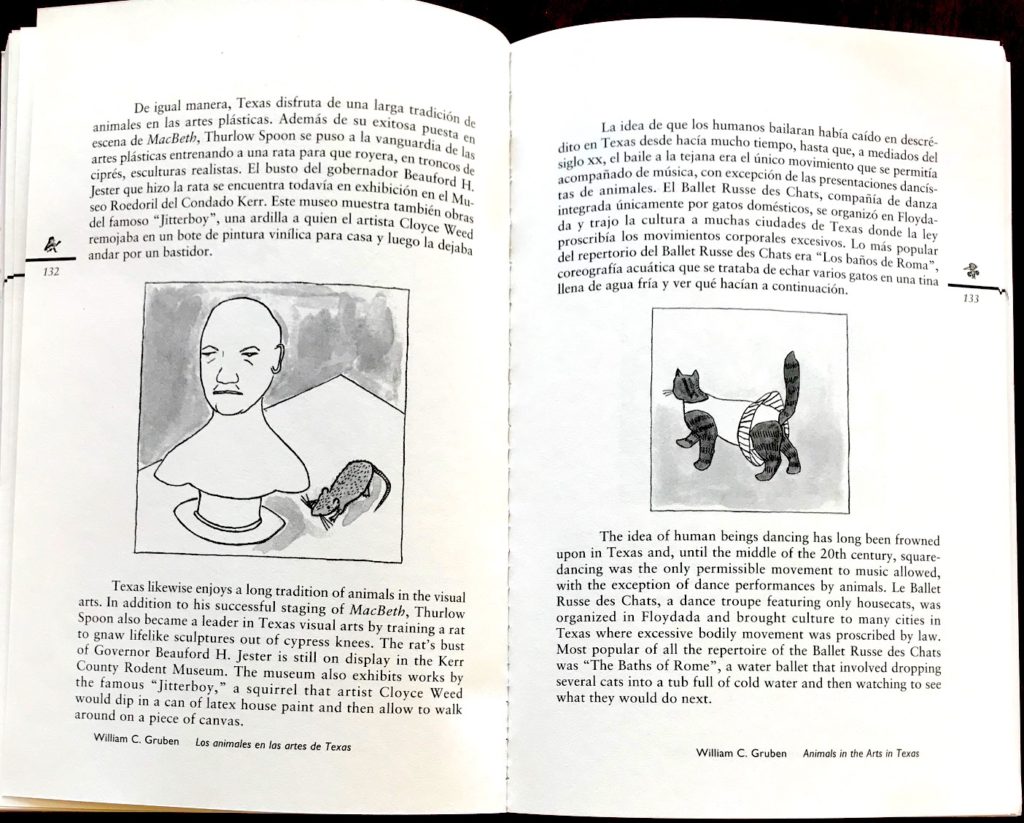
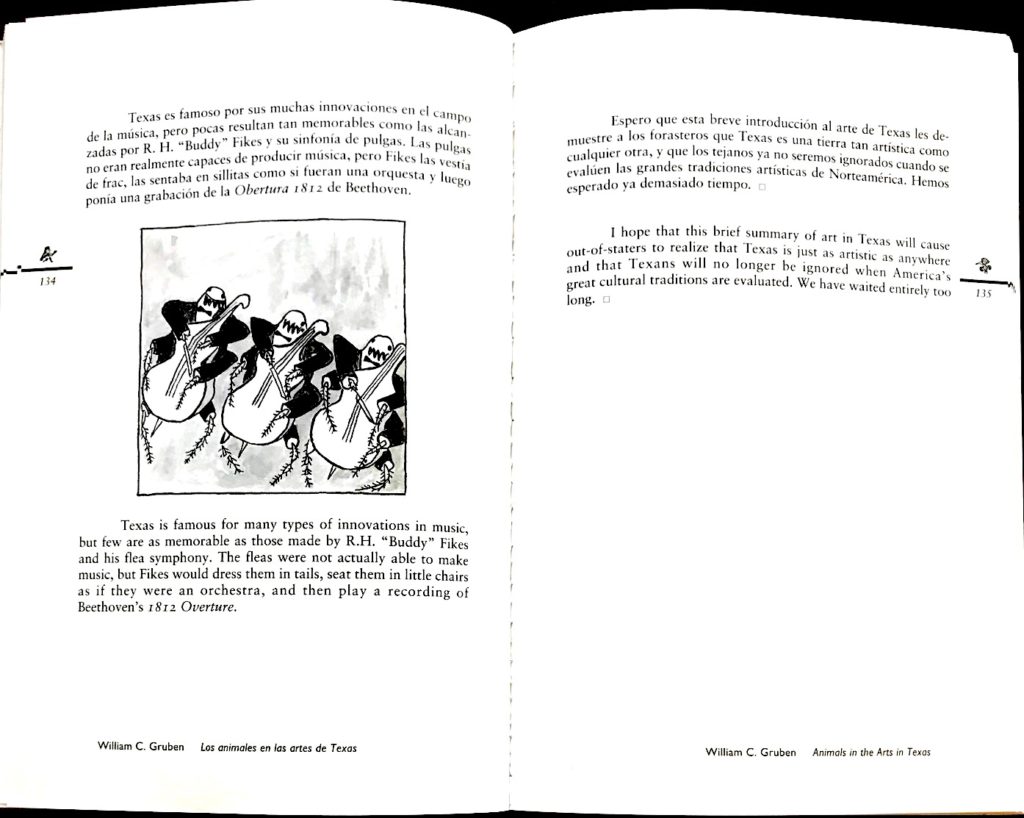
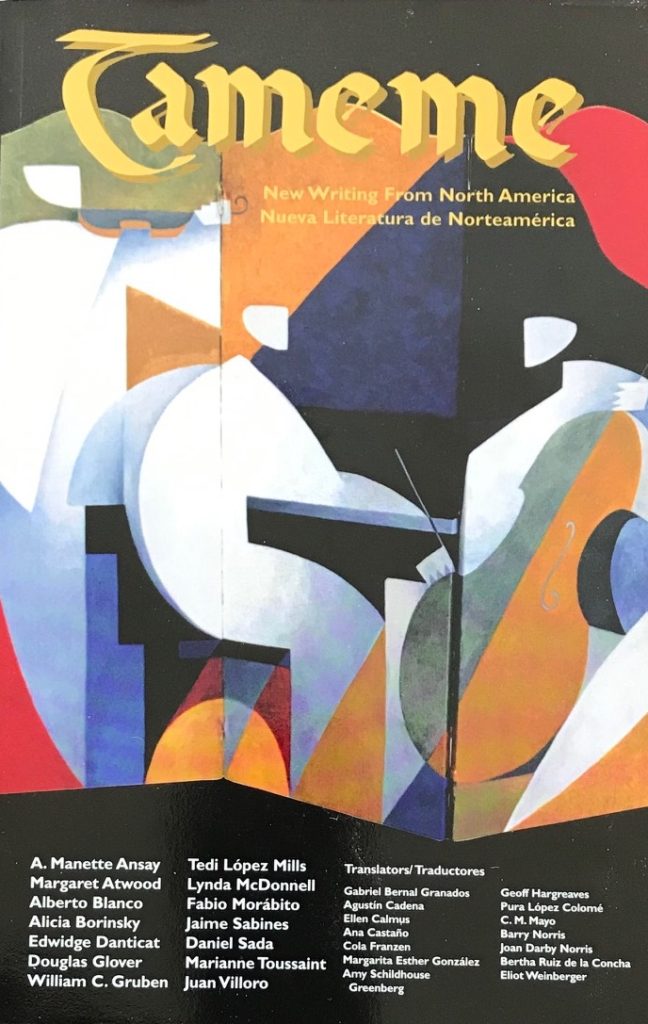
#
From the Dallas Morning News, March 29, 2020:
William Charles Gruben III died peacefully at his Dallas home on Tuesday, March 17th, 2020, at the age of 76, due to complications from an inoperable glioblastoma. Husband, father, economist, polymath, polyglot, musician, humorist, prankster, Bill was a classical thinker, a Medieval scholastic, a Renaissance man, a modern theorist, a postmodern ironist, and, above all else, a true soul of The Enlightenment, in that his whole life was a determined, joyous pursuit of knowledge fueled by the power of human reason and an endless supply of jokes.
Born on September 29th, 1943 in Sacramento, California, Bill was a conscientious and devoted older brother (one not above launching a younger sibling down the occasional laundry chute) during a childhood of multiple family moves: from Illinois to rural Texas, San Antonio, Houston (where he swam the bayous, alligators included) and suburban Dallas. He was an enthusiastic cadet in the Junior Yanks in the mid-50’s, and spent a few weeks every summer at his grandparents’ cotton farm in West Texas. As a high school student he mastered the guitar and the trombone, earning spending money gigging with a Dixieland band. Later in life, he learned to play a mean and somewhat soulful didgeridoo.
A graduate of Richardson High School, SMU, and The University of Texas, where he earned a doctorate in economics, Bill’s working life was a paradox. He spent the better part of his career at The Federal Reserve Bank of Dallas, where he specialized in practical applications of economic theory and the then emerging Mexican and Latin American markets, and where he co-created The Center for Latin American Economics. But Bill’s relationship to “The Dismal Science” was anything but. He understood that at the root of economic study was both the human and the quite-possibly marvelous: that economies were more than diminishing marginal return curves and income elasticity, but places where our desires and dreams collide with reality in all kinds of fascinating and exhilarating ways. An inspiration to colleagues and mentees alike, Bill’s favorite rejoinder while crunching data or preparing a paper or presentation was always, “Do you believe we get paid to do this?!” followed by another one of his brilliant one-liners. For, much as he found joy in Peso stabilization forecasts and comparative GDP analyses, Bill Gruben found hilarity in everything else.
In the 1970s, he, along with his brother, wrote, produced, and hosted a 30 minute comedy show on KCHU called “Dallas Arcade.” In the 80s, he published pieces in The Atlantic that satirized the excesses of oil-boom Texas. He wrote jokes for Joan Rivers, who used some on The Tonight Show, and for Phyllis Diller, who tried to persuade him to dump economics, move to Hollywood, and write comedy full time. Bill Gruben was too good an economist to take her suggestion. But he was terribly flattered.
Upon his retirement from The Dallas Fed, Bill spent his time among homes in Dallas, Laredo, and Monterrey, Mexico. From 2008-2014, at Texas A&M International University, he was Director of the Ph.D. Program in International Business at the University’s A.R. Sanchez, Jr. School of Business, and a Radcliffe Killam Distinguished Professor of Economics; from 2013-14, he directed The Center for Western Hemispheric Trade.
Upon his second retirement, Bill transferred his creative energies from the literary to the visual arts. His last series of canvasses depict the suffering of narcos tormented by comically enraged demons. And even this past January, when he struggled to walk and eat, he insisted on going to Fort Worth to see the Renoir show. He spent two hours on his feet looking at every painting.
Bill is preceded in death by father WIlliam Charles Gruben II, mother Virginia Dorothy Anderson Gruben, and wife, the artist Marilu Flores Gruben. Bill is survived by beloved spouse Nieves Mogas, daughters Adrienne Gruben, a film executive and documentarian, and Anna Gruben Olivier de Vezin, a non-profit director, sons-in-law David Goldstein, a technical director for live broadcast events, and Charles Olivier de Vezin, a screenwriter and film editor, grandchildren Maria Francisca Goldstein and Manel Olivier de Vezin, sister Patricia Gruben, brother Roger Gruben, and a host of adoring nieces, nephews, and cousins. The family expresses its deep gratitude to caregivers Penelope Clayton-Smith, Dario Delgado, and Frank Aven. Due to the coronavirus pandemic, services are on hold, but there will be a virtual service in mid April.
In lieu of flowers, the family welcomes contributions in Bill’s name to The Latin American and Caribbean Economic Association or to El Instituto de Atención Integral Discapacitado Retos, A.B.P.
#

Lonn Taylor (1940-2019) and Don Graham (1940-2019),
Giants Among Texas Literati
Find out more about
C.M. Mayo’s books, articles, podcasts, and more.

